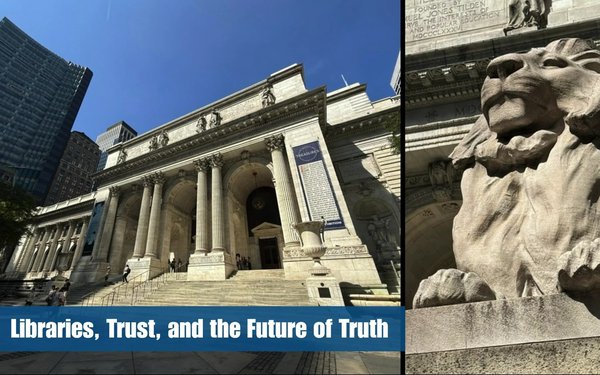
If you find yourself struggling to sort fact from
fiction, you’re not alone. So much of today’s media arrives without clear sources. The underlying evidence—the primary sources—can be hard to track down. But there is a home
for those sources, and it may be closer than you think.
That role came across powerfully in a recent conversation on the “Possible” podcast with hosts Reid Hoffman and Aria
Finger and their guest, New York Public Library (NYPL) president Anthony W. “Tony” Marx.
Hoffman framed the discussion around technology and the future of knowledge. Marx, a
lifelong New Yorker and former president of Amherst College, answered with the clarity of someone deeply attuned to the fragility of truth—and why libraries matter more than ever.
“Libraries are a great tool for sharing information that is trustworthy,” Marx said. “They’re the most trusted institution in this town—or pretty much any
town.”
advertisement
advertisement
That line stuck with me. At a time when media and technology companies spend fortunes trying to earn trust, libraries quietly hold the crown.
Trust, in fact, has become
bigger than books. Marx leads the largest public library system in America: 92 neighborhood branches and four world-renowned research centers. That reach means the NYPL is more than a
repository—it’s a civic infrastructure. Branches act as education centers, community space, and access points for people lacking quiet, internet, or climate control.
But Marx
doesn’t start with books when he talks about the library’s mission. He starts with trust. “If there’s a way we can use AI and its related tools to do more of what we’re
in the business to do, and do it truthfully, that’s our biggest asset—perhaps more than the books.”
It’s a striking admission. For a library president to say trust
holds more weight than books underscores the stakes. Collections matter—but credibility matters more. Without it, nothing holds. And in that, libraries mirror a sharp lesson for media: without
trust, reach and engagement are empty.
The stories Marx tells make this point real. He described visiting the Inwood branch where he grew up and running into a construction worker who came
daily after work to stare at picture books of Renaissance art. “He said to me, ‘I come here every day to look at angels,’” Marx recalled. “And I thought: I need to do
this job.”
That anecdote reveals something deeper. Libraries don’t just provide information; they offer meaning—even to someone in harsh living conditions.
Then
there’s the less poetic, but equally urgent reality. Archivists from the library’s Performing Arts Division showed Marx film and audio tapes literally turning into vinegar; they presented
him a jar of the acid as proof. If cultural memory isn’t actively preserved, it self-destructs. In an age of broken links and shuttering platforms, that jar is a warning. How many of
today’s digital stories will endure?
For Marx, credibility is also the leverage point for innovation. “There’s no regulation, because nobody ever thought our library would
change,” he told the hosts. “That means we can innovate at scale with people who trust us.”
What does that innovation look like? Lending WiFi hotspots to households without
broadband. Eliminating late fees because fines kept people away. Building 100 percent affordable housing atop a branch—to connect literacy, community and shelter. And yes, experimenting with
AI—but not to chase hype. The goal: help people find, understand and trust the collection. It’s a sharp contrast to media, where tools often distract from mission.
And access, he
kept insisting, is part of truth. Preservation isn’t enough if people can’t reach what’s preserved. He described a boy doing homework on a Bronx stoop after hours because his home
lacked broadband. It wasn’t a statistic—it was a life in a snapshot. So the library worked to bring connectivity to those most in need.
For Marx, access isn’t a bonus.
It’s part of truth itself. If only some people can access the record, reality becomes gated. That should resonate with media, where paywalls and vanity exclusives can distort access to
collective memory.
Listening to Marx, the simple takeaway is libraries safeguard truth by preserving it, making it equitable and earning trust. Media must do the same.
Too often, we
treat our output as disposable: articles buried in broken archives, sources behind paywalls, platforms built for the short run. That may optimize for quarterly goals—but it weakens the truth
ecosystem.
Marx’s message is clear. Truth isn’t temporary—but it does need intentional stewardship.
At one point, Marx recalled immigrants walking into the grand NYPL
buildings and asking, incredulously, “You give this away for free?” His pride wasn’t in the collection—it was in the open, trusted relationships at work.
For media,
that’s the challenge: to earn trust like libraries do—by preserving the record, granting access and staying credible. Because when platforms fade and news cycles spin out, trust may be the
only thing that lasts.
And if you find yourself wondering what’s fact and what’s fiction, remember: libraries don’t erase the noise, but they do safeguard the sources.
That’s where the search for truth begins.
The full conversation, “Tony Marx on the Future of Libraries, AI, and Trust,” is available on Apple Podcasts here.